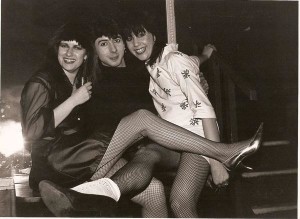[vimeo 92066732]
When Claire Taylor of The Story Mill asked if I’d be interested in doing a video interview about playing a role vs being authentic, I was intrigued. It has been a long time since anyone has asked me about Being Betty Page.
To explain: way back in 1979, when I was secretary to the editor of the music paper Sounds, I started to write reviews of bands. Because I was already employed by the publisher, I had to use a pen name in order to be paid for my writing. The name Betty Page was suggested by my then boyfriend Tony Mitchell, who was a staff writer on the paper and had long been a fan of the Fifties cheesecake pin-up turned bondage model Betty (also Bettie) Page, who was a cult figure at the time and therefore known only to a select few. (She would come to prominence many years later after the making of the movie The Notorious Bettie Page).

And so it was that Beverley became Betty, and went on to forge a successful career in music journalism culminating in the editorship of pop magazine Record Mirror. Unfortunately for Beverley, Betty became a mask to hide behind; a character to play – and that’s what we talk about in the interview. As Claire says, many people play a role or live out a story in business so my story should resonate with anyone who has been given a fancy job title and found themselves playing a part rather than being themselves.
As Claire says on her website: “I had a wonderful conversation recently with Beverley Glick – story archaeologist, co-founder of The Story Party and an editor for The Daily Telegraph. Beverley was a music journalist in the Eighties, regularly interviewing popular bands such as Spandau Ballet, Duran Duran, Soft Cell, Culture Club, The Human League and many others.
“Beverley tells her story, through which we learn more about how the cultural environment in the late Seventies and early Eighties influenced music and shaped the way that female power was defined. We talk about how the music industry challenged conventional ideas about identity and we delve into the themes of authenticity and integrity. Also we discuss how the cultural environment and the music industry shaped Beverley herself, as a music journalist, an editorial leader and as a person.
“The music industry is at the vanguard of cultural change – it shapes and reflects our world. Therefore the themes that we address have a universal resonance – we see them reflected in business and in our beliefs about life.”
I hope you enjoy the interview, and please leave a comment if you’d like to ask me anything or pick up on one of themes discussed.
This question of feeling like you are wearing the wrong costume so resonates with me particularly as I was a film, tv and music solicitor at exactly the time you were a music journalist. Even though I was in an area of the law that was perceived as glamorous and exciting, I was still the boring lawyer (or that’s how I saw it) who had to go and draft the boring document. I always wanted to be doing something creative (this often leaked out) but had taken the safe professional train and it was awfully hard to get off. Becoming a coach after much searching and many wrong turns feels like coming home. Wish it hasn’t taken quite so long though.
Thanks for sharing your story, Rona. Working in the music industry was supposed to be glamorous and exciting – and yes, sometimes it was, but it never filled the black hole on the inside. Like you, it has taken me many years and much soul-searching to find my way home and know that whatever happens, I am enough.